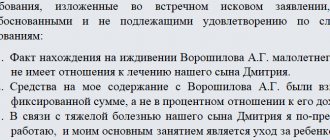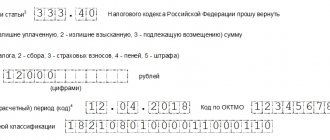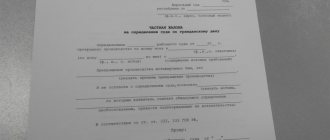When you go to court to solve any problem you have, you always run the risk of having your claim rejected. Officials representing the courts of our country, in the presence of certain circumstances, have the right to refuse citizens to consider a claim. In some cases, refusal may be final, in others you can still fight it.
Refusal to accept a claim
Features of refusal to accept a claim
The court can decide to refuse to consider the claim, which must subsequently formalize it in the form of a ruling and submit it for consideration. Unlike those situations in which the claim is simply returned or remains without movement, but does not disappear from the view of the state authority forever, a case of refusal can only end in the fact that the court will no longer take into account claims characterized by:
- the same subject;
- the same requirements;
- similar defendant.
At the same time, the accompanying conditions in most situations will also not have any weight.
The reasons for refusal are various circumstances
What are the reasons not to accept a claim?
Art. 134 of the Code of Civil Procedure of the Russian Federation contains the following list:
- the application cannot be considered in civil proceedings;
- a person applied to the court to protect the rights of others without having the authority;
- the rights and interests of the applicant are not affected by the contested act of the government authority;
- there is a decision or settlement agreement in a dispute with the same subject, grounds and the same parties, or the court has accepted a waiver of the claim;
- there is an arbitration decision between the same parties, for the same reason and for the same reasons, unless the state court refused to issue a writ of execution.
Grounds for refusal to accept a claim
As we already briefly mentioned in the introduction, there is a list of specific reasons that may serve as sufficient grounds for refusing to consider a claim. Let's look at them further in the table.
Table 1. In what cases does the court issue a ruling to refuse to consider a claim?
| Situation | Description |
| The claim cannot be considered in civil proceedings | Provided that the statement of claim should be considered in a different manner, for example, as an administrative proceeding, the court does not have the right to accept it, and therefore issues a ruling with refusal. |
| The circumstances of the case do not affect the interests of the plaintiff | If the applicant disputes in the statement of claim filed by him such circumstances of a particular case that, in general, do not affect him in any way and do not affect the rights assigned to him and his interests, the court also issues a ruling on refusal. |
| The applicant does not have the right to file a claim | If the person filing the claim does not have the legal authority to do so, the documentation will be returned to him without consideration. An example of such a situation would be an appeal to the court by the plaintiff’s authorized representative, who has not received notarized confirmation of the rights to this action. |
| The dispute in question was previously considered | If the court has previously made a decision on this issue and it has entered into force, this claim will be considered invalid, and therefore the person who files it will be refused further consideration. |
| There is a decision to terminate civil proceedings | If previously, in a case that the plaintiff wants to consider again, a decision was made to terminate the production processes, and the basis for this was the refusal of the same applicant from further proceedings, or the conclusion of a settlement agreement between the parties, the case cannot be reopened. |
| The arbitration court considered a similar case | If the arbitration tribunal made a decision on a case of an identical nature, a refusal can also be expected. |
Code of Civil Procedure of the Russian Federation Article 134. Refusal to accept a statement of claim
What happens when the application is accepted?
If the application in court is accepted for consideration, then they proceed to initiate proceedings in the case, which entails certain legal consequences. After the opening of civil proceedings in the case, the movement of the case begins. Civil procedural legal relations arise between the parties to the claim, and certain rights and obligations appear that they can use during the consideration of the case in court. And the court has an obligation to consider the dispute between the parties and make a decision on the accepted case.
After the plaintiff’s application is accepted by the court, he gets the opportunity to fully use all the rights associated with the movement of this process. The defendant, after the claim has been accepted, has the right to protect his interests and rights.
Advice
In order for the claim to be accepted the first time, it is better to contact a lawyer before writing and filing it. The lawyer will tell you whether you have enough grounds to file a claim, help you draw up a claim and tell you in detail about the procedure for accepting it in court. A lawyer knows how to competently draw up an application so that it is accepted, so in this case there should be no problems with accepting the claim.
In what cases will refusal to accept a claim be considered unlawful?
In some situations, the court's denial of your claim may be considered unlawful. The law stipulates these cases.
- Thus, it is not allowed to issue a ruling on refusal and the refusal to accept the statement of claim, provided that there is no evidence of the claims made by the person.
- Also, the reason for the event that interests us cannot be missing the deadlines for applying to the court.
- In addition, the court does not have the right to refuse your claim in the case where you made demands in the application in relation to an improper defendant.
However, there are also cases in which a refusal cannot be issued, but consequences such as:
- return of claim;
- leaving the statement of claim without progress.
So, in this situation we are talking about the following cases:
- in case of violation of the procedure established by law for resolving disputes between the parties in pre-trial form;
- when filing a claim by a person officially recognized as legally incompetent;
- when departing from compliance with jurisdiction;
- if there is a similar statement in the proceedings of the court considering the claim regarding the conflict that has arisen between the parties.
Situations are also possible in which a refusal cannot be expressed, however, a potential return of the claim will still take place due to less serious reasons. But in this case it will be much easier to submit it again
Wrong choice of legal proceedings
Confusion arises when filing a claim, which must be considered in an arbitration court or according to the rules of administrative proceedings. In the first case, the parties to the dispute are subjects of economic relations, including legal entities not engaged in commerce.
In the second case, for example, a complaint is filed against the actions or inaction of an official or organization performing public or state functions (all government and budgetary institutions). Such complaints are considered in the manner prescribed by the CAS. This is the most frequently used paragraph of Art. 134 Code of Civil Procedure of the Russian Federation.
How is a refusal to accept a claim formalized?
Having made a decision to refuse to accept the claim, a particular judge, within the next five days from the moment the application was submitted for consideration, must issue a ruling characterized by validity. This definition must necessarily contain facts that are, in fact, an objective obstacle to initiating proceedings in the case under consideration.
At the same time, when refusing to consider, the court does not undertake to explain to the plaintiff such nuances as:
- ways to eliminate violations discovered during verification of the statement of claim;
- authorities to which you can contact for further action;
- further course of action aimed at protecting your right.
Also, the court’s ruling must necessarily contain information that the refusal to accept the statement of claim issued in this case will become an obstacle to filing a similar statement.
The refusal does not have to be handed over immediately. It is enough to simply draw up a definition containing it, and subsequently notify the addressee where he can pick up the paper and study it
If the judge does not issue a ruling with a refusal immediately after he has read the application, he is subsequently obliged to separately inform the citizen who compiled it at what time and on what date he will be able to receive the ruling and familiarize himself with it.
Please note: if for any reason the court nevertheless opened a civil case, it does not have the right to refuse to accept the claim after the fact. In this situation, the solution would be to stop production processes on the issue under consideration.
Refund of state duty
When filing a claim, a citizen is required to pay a state fee.
It is returned if the application was refused (Article 333.40 of the Tax Code of the Russian Federation). If the document was considered in an arbitration court, then the official in the ruling indicates not only the reasons for the decision, but also the return of the fee. The judge decides the issue of returning the state fee when returning the administrative claim. The Code of Civil Procedure does not regulate the procedure for returning the fee to the state treasury. The Letter of the Ministry of Finance No. 03-05-04-03/64446 dated 10/04/17 states that the state duty must be paid back to the plaintiff regardless of whether this is stipulated in the court ruling.
To receive the paid fee, a citizen must contact the Tax Service at the location of the court with an application. Documents confirming the fact of payment are attached to the application. The applicant has the right to receive the state fee back if the claim is returned. A citizen can contact the government agency within 3 years from the date of payment.
Refusal to accept a statement of claim means that the court will not initiate proceedings with this defendant, the subject and basis of the case. The plaintiff may appeal the decision no later than 15 days after receiving it. If errors are excluded and the official’s actions comply with current legislation, then the applicant will not be able to submit a second application in the same form. To initiate legal proceedings, the plaintiff must change the defendant, the subject matter of the claim, or the basis of the case. Sometimes it is necessary to contact another authority that has jurisdiction over the issue under consideration.
Appeal against refusal to accept a claim
Refusal to accept a claim may be appealed. However, before you begin this process, take care of the question of whether it was actually illegal, because in other cases it cannot be challenged.
If you nevertheless decide to continue, then file a private complaint with the court, which will be considered superior to the one that was considering your case before the decision to refuse was made.
The time limit for appeal is 15 days from the date of the refusal. Please note that we are talking about counting time from the moment it is made, and not from receiving the determination.
You have 15 days to appeal the refusal to accept a claim from the date the order was issued.
Appealing the decision
Within 15 days after receiving the refusal, the applicant has the right to appeal the decision of the official to a higher authority (Article 332 of the Code of Civil Procedure of the Russian Federation).
The period is counted from the date of the ruling. If the applicant received a copy of the document later, this is not a reason to extend the specified period. A private complaint is filed if the plaintiff does not agree with the court's ruling .
Its sample contains the following information (Article 322 of the Code of Civil Procedure of the Russian Federation):
- name of the authority where the document is submitted;
- information about the applicant;
- number of the case against which the ruling is being appealed;
- grounds for the illegality of the official’s decision;
- applicant's requirements;
- list of applications.
What to do if your claim is rejected
Unfortunately, if you were unable to appeal the refusal, the law will not offer you any other ways to somehow achieve what you want. Try to draw up a claim with a different content, having first received help from a specialist on this issue.
There is no other way to solve your problem, because:
- the court of other jurisdictions will not consider your case;
- miscarriage of justice will be completely ruled out;
- there will be no reason to consider the refusal unfair.
Try filing a claim in a slightly modified format, since it is possible that if you eliminate all sorts of errors, the court will no longer have anything to cling to.
Please note: if you filed a claim and were denied, you have the right to return the fee previously paid to the state treasury. We will consider this issue in more detail in a special article.
The best way out when refusing to accept an application is to rework it by changing the text or other nuances that were not approved by the court, thereby eliminating the grounds for creating obstacles in your case
Lack of authority
Often, confusion in documents or their incorrect execution prevents organizations from filing a lawsuit in the interests of third parties at their request. This is due to the fact that the organization, firstly, must have the status of a legal entity, and secondly, the right to represent the interests of the main organization at its location in accordance with the constituent documents.
In the case of citizens, a similar example can be given regarding the rights granted to legal representatives. A person who does not have a power of attorney from them, or who has not been appointed by the guardianship authority, does not have the right to represent a child who is not yet 18 years old. He cannot yet issue a power of attorney, unless he is emancipated by court.
The absence of a power of attorney in the materials of the claim or the signature of the applicant, or an indication of his status in the case, is assessed by the court as grounds for returning the application, and not refusing to accept it. Having corrected the shortcomings, you can file a lawsuit again.
Nothing superfluous: the Supreme Court told when it is impossible to return a claim
Spouses Alexey Kungurov* and Irina Zhdanova* divorced in 2015. The court determined the place of residence of the two children with their mother. And also resolved the issue of the order of communication between the father and his sons - on Saturdays from 15:00 to 18:00 at the boys’ place of residence. In 2021, Kungurov decided to change these rules, so he filed a lawsuit against his ex-wife about the procedure for exercising parental rights.
But the Sovetsky District Court of Krasnodar left the claim without progress (case No. 9-674/2019). After all, Kungurov did not provide information about his permanent place of residence, an inspection report on living conditions, information about his financial situation and other documents. In addition, the court referred to the absence in the claim of an indication of the involvement of the guardianship and trusteeship authority in the case as a third party. The court also pointed out that Kungurov did not attach copies of the claim material for the defendant and the guardianship and trusteeship authority. The Krasnodar Regional Court left the decision of the first instance unchanged.
Kungurov did not agree with the position of the courts and appealed to the Supreme Court. He considered the conclusions of the lower authorities illegal. The Supreme Court agreed with this and sent the case for a new trial to the court of first instance (case No. 18-KP9-182).
The Supreme Court emphasized that Article 46 of the Constitution guarantees judicial protection to everyone. Therefore, claims cannot be rejected for reasons not specified in the law. Art. 131 of the Civil Code provides a specific list of what the plaintiff must attach to the statement of claim. Therefore, the Supreme Court concluded that the courts required documents from Kungurov that he was not obliged to provide at the stage of filing the claim. The court could receive these papers at the stage of preparation for the case. After all, Art. 150 of the Code of Civil Procedure obliges the judge, when preparing the case for trial, to interview the plaintiff or his representative. Also offers, if necessary, to provide additional evidence within a certain period.
The Supreme Court, in particular, recalled Art. 132 of the Code of Civil Procedure, which states that copies of the claim material must be attached only when the defendant and third parties do not have them.
But lower courts ignored these rules.
Lawyers about the case
According to Andrey Panov, lawyer at Allen & Overy Allen & Overy Federal rating. group Corporate Law/Mergers and Acquisitions group Maritime Law group Natural Resources/Energy group TMT group (telecommunications, media and technology) group Transport Law group Financial/Banking Law group Bankruptcy (including disputes) group International Arbitration group Arbitration proceedings (major disputes - high market ), the position of the lower courts contradicts the very idea of adversarialism, which assumes that the court evaluates the entire body of evidence within the framework of the process, and not at the stage of accepting the claim. Dmitry Melkov, senior lawyer Kursiv Legal Partnership Kursiv Legal Partnership Regional rating. Group Land Law/Commercial Real Estate/Construction Group Tax Consulting and Disputes Company Profile, adds that such a solution is not the only one. “Previously, the Supreme Court has repeatedly expressed a similar position, for example, in the Ruling of the Supreme Court dated August 26, 2021 No. 32-KG19-21,” the expert shares.
The position of the Supreme Court is also important because sometimes the plaintiff may not have the necessary evidence. He has the right to ask the court to claim them, but first the court must accept the application for proceedings.
Experts explained how the vessels' failures could be explained. “This happens when the amount of the claim is significant or when the claims against one of the co-defendants are not obvious. But, as a rule, the court is ready to resolve such issues even after the claim has been accepted for proceedings,” shares Viktor Petrov, head of the arbitration practice of VEGAS LEX VEGAS LEX Federal Rating. PPP group/Infrastructure projects group Land law/Commercial real estate/Construction group Antitrust law (including disputes) group Arbitration proceedings (major disputes - high market) group Tax consulting and disputes (Tax consulting) group Natural resources/Energy group Insurance law group Environmental law group Corporate Law/Mergers and Acquisitions group Tax consulting and disputes (Tax disputes) group Bankruptcy (including disputes) 2nd place By revenue 3rd place By revenue per lawyer (more than 30 lawyers) 8th place By number of lawyers Company profile. The senior partner of INTELLECT (INTELLECT) INTELLECT (INTELLIGENCE) Federal rating speaks about the formal reasons for refusal. group Digital economy group Intellectual property (including disputes) TMT group (telecommunications, media and technology) 13th place By number of lawyers 25th place By revenue per lawyer (more than 30 lawyers) 36th place By revenue Company profile Roman Rechkin: “Courts are especially likely to make such (inflated) demands are presented in the pre-New Year period, when the courts are busier than usual. Leaving the statement of claim without movement allows the court not to formally accept the claim for proceedings and not to consider it.”
Sergey Kislov, partner of the board Kovalev, Tugushi and partners Kovalev, Tugushi and partners Federal rating. group Arbitration proceedings (major disputes - high market) group Dispute resolution in courts of general jurisdiction group Insurance law group Bankruptcy (including disputes) group Labor and migration law (including disputes) group Pharmaceuticals and healthcare group Criminal law group Corporate law/Mergers and acquisitions 9th place In terms of revenue per lawyer (more than 30 lawyers) 23rd place In terms of the number of lawyers 25th place In terms of revenue, he also sees the reason for the overload of courts of general jurisdiction and talks about how lawyers struggle with the problem of “immobilization”: “In order not to waste time, we have to agree with the illegal ruling on abandonment claim without movement. It is always faster to send the “necessary” documents than to challenge a judicial act. In rare cases, when the court requires confirmation of facts that is impossible, it is necessary to challenge it.”
When courts do not accept claims
Pravo.ru experts spoke about cases where courts unlawfully leave claims pending or return them. They may require the following documents:
- Insufficient evidence
In court, you may also face the fact that the case will be immobilized because, in the judge’s opinion, insufficient evidence has been presented. Denisov talks about such a dispute. The Perovsky District Court of Moscow left the claim without progress and pointed out the absence of all documents that confirm the notification of other members of the housing cooperative about the filing of the claim (case No. M-3683/2018). The Moscow City Court (case No. 33-39738/2018) overturned this decision. The judge's arguments about the insufficiency of documents cannot serve as an obstacle to the protection of rights. At the same time, the court is not deprived of the opportunity to clarify the necessary circumstances during pre-trial preparation and trial.
Oksana Peters, partner at Eversheds Sutherland Eversheds Sutherland Federal Rating, talks about a similar situation. Environmental Law group Intellectual Property group (including disputes) Labor and Migration Law group (including disputes) Antitrust Law group (including disputes) Corporate Law/Mergers and Acquisitions group Natural Resources/Energy group TMT group (telecommunications, media and technology) Arbitration group (major disputes - high market) group Bankruptcy (including disputes) group Land law/Commercial real estate/Construction group Tax consulting and disputes (Tax consulting) The profile is technical in nature. The appeal overturned the court's ruling and indicated that: 1) the court did not have the right to refuse the petition on this basis, 2) additional documents, if necessary, could be presented by the applicant during the court hearing.
- Original instead of copy
Sometimes copies of documents are not enough for courts, and questions about authenticity arise when the claim has not yet been accepted. This happened in the practice of Irina Kuznetsova, managing partner of MCK LAW: “They demanded from us the original expert’s opinion, although a copy was attached to the statement of claim.” The plaintiff was given a period to correct the “error.”
- Evidence of prejudice
Art. 69 of the APC exempts from proving circumstances that are established by a judicial act of the arbitration court that has entered into legal force, if the same persons participated in the case. There is also no need to prove information that was established by a court of general jurisdiction and is relevant to the persons participating in the present dispute. But the courts do not always remember this. “In bankruptcy cases, courts sometimes leave without progress applications where claims are based on decisions presented to the court. The acts have already entered into force; they have prejudicial significance. But arbitration courts ask to attach, for example, the agreement on the basis of which those very decisions were made,” says Velyuga.
- Inventory of attachment
Sometimes, for courts of general jurisdiction, receipts for sending the claim to the defendant with attachments are not enough. “They began to often ask for an inventory of investments in a valuable letter as evidence of sending a claim to the defendant,” says Egor Kovalev, lawyer at the Delcredere Delcredere Federal Rating board. group Arbitration proceedings (major disputes - high market) group Bankruptcy (including disputes) Company profile. Thus, the courts only complicate access to justice, Kovalev believes.
- No diploma
After the changes came into force in October 2021, for many categories of cases, the presence of a higher legal diploma has become mandatory. This became the reason for the return of claims. Peters considers this behavior of the courts to be unlawful. “The courts are returning statements of claim on the grounds that they were not accompanied by copies of documents on higher legal education or an academic degree in a legal specialty. This contradicts Art. 126 of the APC, which establishes an exhaustive list of applications. It doesn’t say anything about diplomas.” For example, the rulings of the Arbitration Court of the Republic of Mordovia dated December 10, 2021 in case No. A39-14125/2019 and of December 09, 2021 in case No. A39-13996/2019, the Arbitration Court of Moscow dated December 17, 2021 in case No. A40-321967/2019, Resolution of the Seventeenth Arbitration Court of Appeal dated November 12, 2021 No. 17AP-16545/2019 in case No. A50-29533/2019.
- Documents on payment to representatives
You can find yourself in a situation where, even before accepting a claim, the courts begin to require documents on settlements with representatives. Victoria Veluga, lawyer at the firm Intellectual Capital Intellectual Capital Federal rating. group Intellectual property (including disputes) group Arbitration proceedings (medium and small disputes - mid market), shares a case from practice: “It happened that the courts demanded proof of payment for legal services even before they accepted the claim for proceedings. Moreover, the demand for recovery of legal costs was stated as additional.”
* Full name changed by the editors.
- Alina Winter
- Supreme Court of the Russian Federation
Arbitration decision
The court has the right to refuse to issue a writ of execution if the arbitration tribunal made significant errors when considering the dispute. In Art. 426 a list of them is given.
In this case, the participants in the process have the right to file a similar claim in court on the same grounds, for the same reason and on the same subject. When filing a claim, be sure to attach to it a copy of the wording of the refusal to issue a writ of execution.






